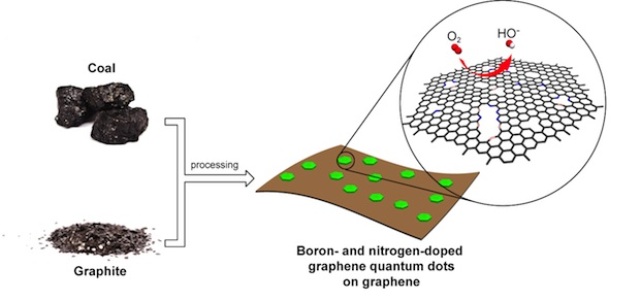Oct 1 2014
 Rice University scientists combined graphene quantum dots, graphene oxide, nitrogen and boron into a catalyst capable of replacing platinum in fuel cells at a fraction of the cost. Illustration courtesy of the Tour Group
Rice University scientists combined graphene quantum dots, graphene oxide, nitrogen and boron into a catalyst capable of replacing platinum in fuel cells at a fraction of the cost. Illustration courtesy of the Tour Group
Researchers at Rice University have combined graphene quantum dots (GQD) with graphene oxide sheets and created a hybrid material that could help reduce the cost of energy generation using fuel cells. Previously, GQDs had been created from coal by chemist James Tour’s lab. These GQDs could grasp onto graphene platelets very strongly.
James Tour is a professor of materials science, computer science and nanoengineering and is also the T.T. and W.F. Chao Chair in Chemistry at Rice University. Huilong Fei, a graduate student is the lead author of the paper.
The team exfoliated graphene oxide sheets from common graphite. Following this, they boiled a solution of graphene oxide sheets and GQDs. This made these materials to combine into self-assembling nanoscale platelets. Boron and nitrogen were then used to treat these platelets. The resulting hybrid material acquired the advantageous properties of each of these components.
A large amount of edge was contributed by GQDs, which allowed the reduction in oxygen required for fuel cell operation. The excellent conductive matrix was contributed by graphene. Nitrogen and boron together added more active sites.
Conventionally, platinum/carbon hybrid materials are used in fuel cells. However, the material created at Tour lab’s performed better than these hybrids. When compared to platinum-based catalysts, this hybrid material demonstrated 70% more current density, and more oxygen reduction reaction. Further, the flake-like hybrids could be produced from materials that are less expensive, when compared to platinum which is prohibitively expensive.
This study has been published in ACS Nano, a journal from the American Chemical Society.